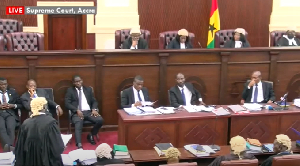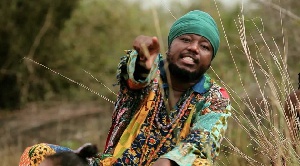Opinions of Friday, 5 October 2007
Columnist: Obeng, Mensah Richard
Making Respect For Our Moral Values A Priority
There has never been any meaningful society without respect for moral values, good standards and principles. The need for upholding certain standards considered to be important is a prerequisite for the advancement of any state. Moral values at most controls the behaviour of its adherents in a positive direction.
INDISCIPLINE
It is indisputable that the bane to the development of Ghana is indiscipline (blatant disregard for our cherished standards and values). As a matter of fact, lawlessness has been the blight to our fast advancement as a nation since our treasured independence in 1957. The various policies of our successive governments did not see the total light of the day due to the lack of self-discipline among majority of Ghanaians. Gross indiscipline has normalised engagement in certain acts in the Ghanaian society. They include, but not limited to, wanton disregard for the laws of the land like building in water courses, resulting in floods, indiscriminate dumping of waste, rampant mob action and vigilantism, increasingly police brutality, bribery and corruption, embarking on unlawful strikes and poor attitude towards work.
CAUSES
Among the usual reasons assigned to gross indiscipline in the Ghanaian society is ignorance. The ignoramuses in our midst are often culpable of acts of unruliness because it is barely difficult for such persons to make personal public enquiry into their actions and actions. To them, things are right if they satisfy their basic needs without thinking about the repercussions to the larger society. Besides, gross indiscipline abound because most Ghanaians perpetuate these unlawful deeds under the guise of ignorance of the fact that their actions are not permitted. In addition, there has been inaction of those who should have acted. Most of our authorities and our various oversight bodies who are to ensure that Ghanaians do things right are indifferent. Put differently, most of our law enforcement agencies are compromising. Perhaps, such leaders are guilty themselves. It takes character to criticise character. As for example, the numerous bye-laws in the books of our district assemblies are mere rhetoric. More so, the common excuse that everyone is indiscipline is invariable another root cause. Ironically, the naughty ones regard the self-controlled ones as those who are behaving oddly. Consequently, the disciplined ones turned to abandon their societal principles and therefore join the crowd. It has become a common saying that act of indiscipline is indeed a catalyst for getting things done in a shorter period of time in the Ghanaian society. Disgracefully, what is to be done in years by complying with certain standards could be achieved just in a day through acts of indiscipline. Finally, the so-called electoral defeat is another root cause of indiscipline. Most of our leaders do not act to ensure law and order because they are afraid to lose their political positions since they think the people will unseat them if they do things that do not please the people (the undisciplined ones). Therefore, decongestions exercises always end as a fiasco after billions of cedis have been spent on such fruitless exercises. Interestingly, every year we spend billions of cedis to clean our cities but the value is still the same. Our leaders have chosen to receive praises from the present generation only to be damned by posterity; hence almost all our previous governments are remarked to be bad. Meanwhile those leaders were crowned as political messiahs while in office.
MISPLACED PRIORITY
The campaign against greater indiscipline initiated by the vice president some years ago seems, if not completely, to be dying. Commendably, the Ministry of Information and National Orientation on Thursday, August 22, 2007 launched what is termed the five pillars of national orientation which are expected to serve as reference points for charting new paths for national development. The five pillars are Proud to be Ghanaian; Patriotism and a Spirit of Ghana First; A Can-Do-It Attitude; Productivity and Accountability; and Dedication and Discipline. I must concede that various educational adverts have been ran in both the electronic and the print media to sensitise Ghanaians about the above values. However, it leaves much to be desired that we seem not to be pumping much effort into the implementation this important policy. How do Yaw Preko and Fusseina appreciate the need to adhere to these principles if the media is our only medium to sensitize the public? What happens if Yaw and Fusseina are far from the media? It is the humbly submitted that these pillars could never be building blocks aimed at helping to achieve a defined national mission if we fail to deem this important policy as a priority. It is the candid view of the writer that these issues should stand tall among the national agenda since they are the very foundations for our so-called pleasant policies.
Captivatingly, our political leaders and political aspirants fail to see the fight against greater indiscipline as a priority. They seem to be interested in citing figures of arithmetic about wages and prices, and about graphs and GDPS. It is quite unfortunate that these leaders fail to appreciate that the question of condition of the people cannot be resolved by citing these economics jargons. What is important is the condition and disposition of the people; their beliefs and feelings, their sense of right and wrong, their attitudes and habits that would dispose them either to a wholesome composures, frugality and prosperity or to an acid unrest, recklessness. The ethos of society; its moral and spiritual character cannot be reduced to economic, material, political or other factors. Values in their own right are determining factor which can change everything especially the blatant violation of rules and regulations, which in turn creates mayhem and commotion-INDISCIPLINE (Credit: Values Advocates).
THE WAY FORWARD
It is very instructive that our political leaders should prioritise respect for moral values and good societal standards above all policies since indiscipline is our major challenge. It is said that one cannot change society and wind up with anything good and lasting without changing the individuals in it. It follows without saying that the condition and disposition of the people, their beliefs and feelings, their sense of right and wrong, their attitudes and habit are the basic things that need to be addressed urgently. Again, it is the down-to-earth submission of the writer that people should be dealt with according to the law, and that ignorance of the law is no excuse. The very act of applying the law is in itself a form of education for the people. A tool is a tool when it is used for the purpose of which it was manufactured, hence the need to strictly, but in a humane manner, enforce our laws. Furthermore, the Ministry of Information and National Orientation should via the National Commission for Civic Education (N.C.C.E) undertake vigorous and meaningful public education throughout the country to sensitise the citizenry about the five pillars for national orientation. As a final point, we Ghanaians must reflect on how our personal attitude is hindering the progress of our motherland, hence the need to change positively for a better projection into the future. To be worthy citizens of our country, certain principles like proper human relationships, self-independence, service to the community, observance of certain standards of conduct and behaviour must be observed. Fellow Ghanaians, let us cross the Rubicon in the cardinal virtues such as: prudence, temperance, justice, fortitude or faith, hope and charity which will go a long way to enhance our development.













